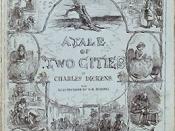Resurrection is an important theme in Tale of Two Cities, metaphorically and literally. Sydney Carton, Madame Defarge, and Dr. Manette experience the most obvious resurrections in the book.
Resurrection exemplifies Sydney Carton who is redeemed from a miserable life of working under Stryver to sacrificing his life for Charles Darnay. Carton is described as a lowly "jackal" in service to Stryver, who drinks excessively with Stryver and is careless in regard to dress and speech. Carton is even described as "so careless as to be almost insolent," but after Carton travels to France, he abstains from drinking and liberates himself from Stryver. Before his death, a changed Sydney Carton says, "I am the Resurrection and the Life, saith the Lord: he that believeth in me, though he were dead, yet shall he live: and whosoever liveth and believeth in me shall never die," which exemplifies belief in his own resurrection.
Madame Therese Defarge is resurrected along with the millions of other peasants in the revolution. They return power to the people and Madame Defarge is prominent among them. She is now able to take her revenge on the Evremondes and she accomplishes this by her testimony that sends Darnay to jail. Later she attempts to send Lucie and her daughter to that same prison. Madame Defarge had been so completely imbued with hatred for the aristocratic ruling French class, particularly the Evremondes, that it was not in her nature to have the charitable characteristics of Sydney Carton. Her resurrection, then, was also a resurrection of hatred.
Dr. Alexandre Manette however is the literal resurrection in the book. In fact, he is resurrected several times. The book opens with the cryptic message from Mr. Lorry "Recalled to Life." This refers to Dr. Manette's release from the Bastille, and the subsequent need...


